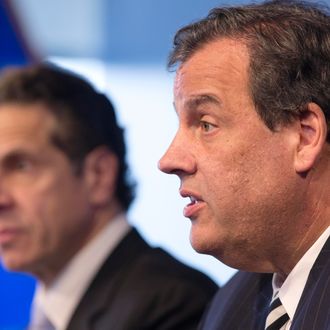
On Friday afternoon, New York Governor Andrew Cuomo and New Jersey Governor Chris Christie announced a new policy for people arriving at JFK and Newark Liberty airports from Liberia, Sierra Leone, and Guinea: Anyone who was exposed to Ebola during their time in West Africa will now be placed in a 21-day quarantine, regardless of whether they have symptoms of the disease. Soon after, a nurse who had cared for Ebola patients in Sierra Leone landed at Newark and was directed to a “quarantine station,” where she supposedly developed a fever. Her next stop was the nearby University Hospital.
On Saturday morning, the New Jersey health department released a statement saying that the woman — who appeared to be in good health — had tested negative for Ebola. She will, however, remain isolated. “Physicians at University Hospital continue to monitor the patient and consult with the Department of Health and the CDC on patient evaluation and any potential need for additional testing,” the statement explained.
Cuomo and Christie’s mandatory quarantine rule is much stricter than what is recommended by the Centers for Disease Control and Prevention. (The D.C., Atlanta, and Chicago airports are sticking with the federal guidelines for now.) It’s not clear where the governors intend to put affected travelers while they wait out Ebola’s three-week incubation period.
Update: On Saturday afternoon, the nurse identified herself as 33-year-old Kaci Hickox. In a piece published to the Dallas Morning News, Hickox described what sounds like a truly unpleasant experience at the Newark airport. She also wrote that she never actually had a fever.
According to Hickox, she was first greeted in Newark by an immigration official who informed her that “They are probably going to ask you a few questions” because she had come from Sierra Leone:
He put on gloves and a mask and called someone. Then he escorted me to the quarantine office a few yards away. I was told to sit down. Everyone that came out of the offices was hurrying from room to room in white protective coveralls, gloves, masks, and a disposable face shield.
One after another, people asked me questions. Some introduced themselves, some didn’t. One man who must have been an immigration officer because he was wearing a weapon belt that I could see protruding from his white coveralls barked questions at me as if I was a criminal.
Two other officials asked about my work in Sierra Leone. One of them was from the Centers for Disease Control and Prevention. They scribbled notes in the margins of their form, a form that appeared to be inadequate for the many details they are collecting.
I was tired, hungry and confused, but I tried to remain calm. My temperature was taken using a forehead scanner and it read a temperature of 98. I was feeling physically healthy but emotionally exhausted.
Three hours passed. No one seemed to be in charge. No one would tell me what was going on or what would happen to me.
Eventually, another official came by to take Hickox’s temperature with a “forehead scanner” that showed she had a fever of 101. “I explained that an oral thermometer would be more accurate and that the forehead scanner was recording an elevated temperature because I was flushed and upset,” Hickox wrote. She ended up waiting alone for another three hours until she was transported to University Hospital by a police motorcade.
Hickox claims that the doctors at the hospital were “puzzled” after taking her temperature:
“Your temperature is 98.6,” they said. “You don’t have a fever but we were told you had a fever.”
After my temperature was recorded as 98.6 on the oral thermometer, the doctor decided to see what the forehead scanner records. It read 101. The doctor felt my neck and looked at the temperature again. “There’s no way you have a fever,” he said. “Your face is just flushed.”
My blood was taken and tested for Ebola. It came back negative.
Hickox wrote that she’s “scared” that her fellow health workers will suffer similar treatment as a result of trying to help people in Ebola-stricken West Africa: “I am scared that, like me, they will arrive and see a frenzy of disorganization, fear and, most frightening, quarantine … We need more health care workers to help fight the epidemic in West Africa. The U.S. must treat returning health care workers with dignity and humanity.”





























